SPOTLIGHT ANALYSIS
Vaccine partnership with US government boosts prospects for SA production
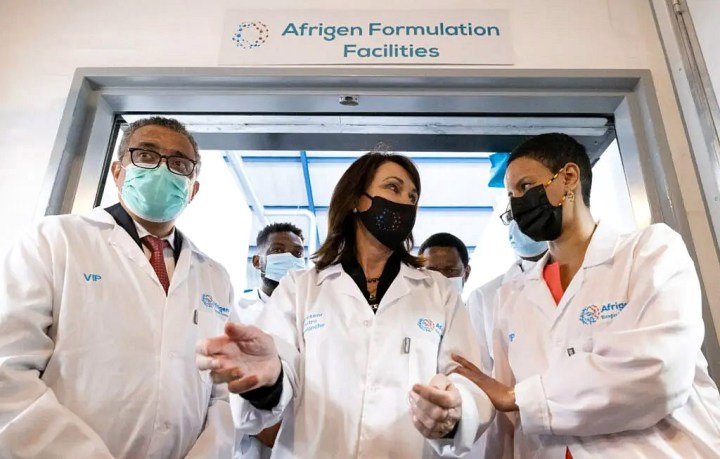
Earlier this month Cape Town-based vaccine company Afrigen announced a formal collaboration with the United States National Institute of Allergy and Infectious Diseases’ Vaccine Research Centre. Catherine Tomlinson unpacks what this deal may mean for local production of vaccines for Covid-19 and other diseases.
It has been just over a year since the World Health Organization (WHO) announced the selection of Afrigen Biologics, a Cape Town-based biotechnology company, to host its ambitious new project to create and transfer capacity to produce mRNA vaccines within and across developing countries.
Since the announcement that Afrigen would host this WHO-backed “mRNA technology transfer hub”, the company has gone from strength to strength.
Earlier this year, Afrigen made headlines around the world when the company announced that it had successfully produced a laboratory-scale batch of mRNA vaccine substance without any help from Moderna and Pfizer/BioNTech — the pharmaceutical companies with mRNA vaccines in the market. Both companies had declined calls to support the WHO-backed hub.
Building on that initial success, this month Afrigen announced a promising new partnership with the United States government. The partnership will enable Afrigen to draw on expertise from leading scientists who played a pivotal role in the development of mRNA vaccine technology.
Professor Glenda Gray, president of the South African Medical Research Council, one of several consortium partners supporting Afrigen’s efforts, described the newly announced partnership as “catalytic for the kind of work that we’re going to do here”.
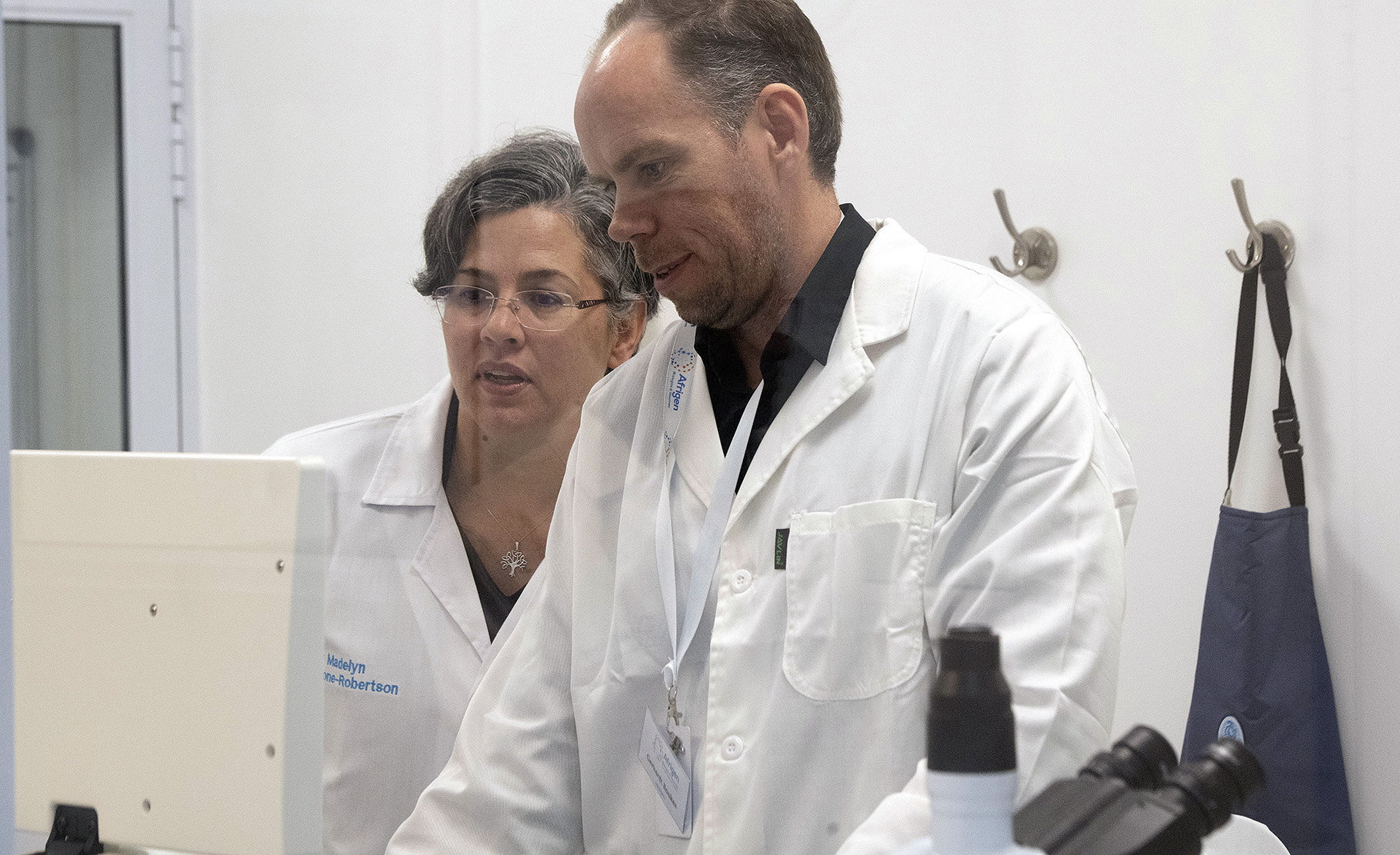
Afrigen’s Dr Gerhardt Boukes (right) and Dr Madelyn Johnstone-Robertson, work in the laboratory at Afrigen laboratories, the World Health Organization Vaccine Hub, in Cape Town. (Photo: Rodger Bosch / MPP / Spotlight)
What has Afrigen achieved so far?
Without a ‘turn-key’ technology transfer partnership with either Moderna or Pfizer/BioNTech, scientists at Afrigen and its academic partner the University of Witwatersrand (Wits) have relied on publicly available data, and the support of international scientists not affiliated with Moderna or Pfizer/BioNTech, to make laboratory-scale batches of a Covid-19 mRNA vaccine.
“We really had to try and trawl through the available information in the public domain to try and get together what is required to make a Covid vaccine,” says Professor Patrick Arbuthnot of Wits University. “That was not particularly straightforward, because the information is not complete.” Arbuthnot worked with Afrigen to develop their candidate vaccine.
During the announcement of Afrigen’s new partnership with the US government, Arbuthnot said that Afrigen’s vaccine candidate is showing promising results in mice studies.
“We started a study in mice about six weeks ago. We took these formulations and put them into the mice, and we measured the immune response to this vaccine” says Arbuthnot, “we got a very good immune response… [the] antibodies that were produced in the mice were extremely effective.”
In addition to developing a vaccine candidate and undertaking initial laboratory and animal testing, Afrigen has also begun to train manufacturers from across the developing world on mRNA manufacturing processes. Fourteen manufacturing entities have already been selected by the World Health Organization to receive the training and a technology transfer package.
According to Soumya Swaminathan, Chief Scientist at the WHO, “five of these recipients have already received the initial introductory training in Afrigen and the remaining will be coming in. There is already a roster that’s been established for this.”
In South Africa, Biovac has received initial training from Afrigen to enable the partially government-owned vaccine manufacturer to eventually manufacture and commercialise Afrigen’s Covid-19 mRNA vaccine.
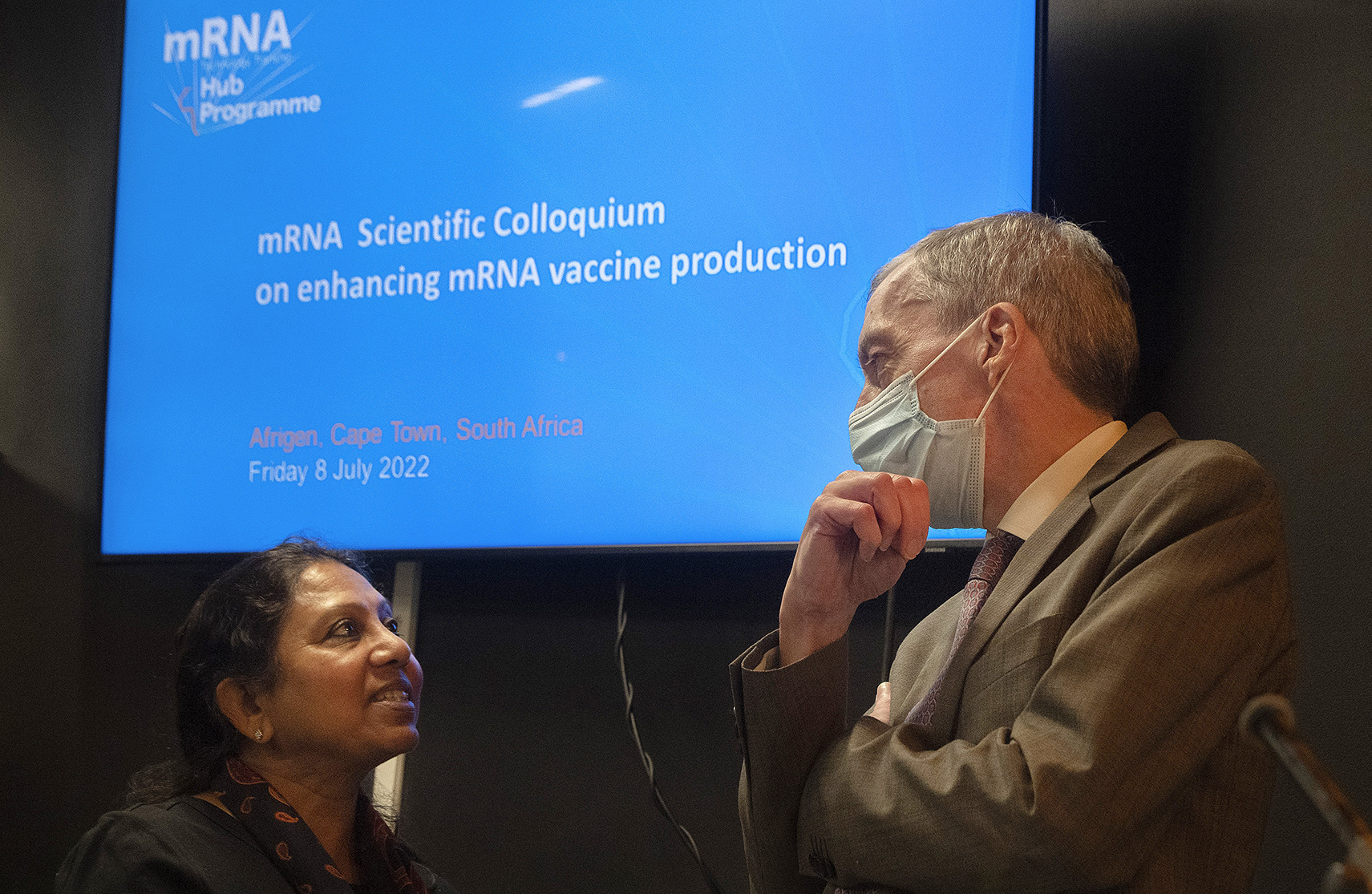
A panel of experts take part in the mRNA Scientific Colloquium at Afrigen laboratories, the World Health Organization Vaccine Hub, in Cape Town. (Photo: Rodger Bosch / MPP / Spotlight)
Why is the new partnership important?
One critical aspect of the new partnership is the specific US government entity that is involved.
Afrigen is now in a formal collaboration with the National Institute of Allergy and Infectious Diseases’ (Niaid’s) Vaccine Research Centre (VRC). Niaid is part of the United States National Institutes of Health (NIH) and is tasked by the US government with responding to emerging infectious disease threats. The US NIH is the largest global funder of biomedical research, including critical basic science research that lays the foundation for product development by industry.
Decades of research and public investment in mRNA vaccine technology, including by the VRC, laid the scientific foundation for the rapid development of Covid-19 mRNA vaccines by Moderna and Pfizer/BioNTech following the emergence of Sars-CoV-2.
A pre-existing pandemic response partnership between the VRC and Moderna was quickly pivoted in 2020 to develop and test a Covid-19 vaccine. When Moderna’s mRNA vaccine was first authorised for use in the United States, Niaid Director Anthony Fauci said, “Several years before Sars-CoV-2 entered the public consciousness, Niaid scientists were working with Moderna to develop vaccines for other coronaviruses. That existing scientific foundation is what enabled both partners to move quickly to develop the mRNA-1273 vaccine candidate against the novel Sars-CoV-2 coronavirus.”
The new partnership between the NIH and Afrigen means that scientists in Afrigen will now receive support, knowledge transfer, and training from some of the same US government scientists that contributed to the development of mRNA vaccine technology and Moderna’s vaccine against Covid-19.
According to Afrigen’s Technical Director Caryn Fenner, the VRC will specifically support Afrigen’s efforts to develop a Covid-19 vaccine by supplying “the starting material, the plasmid DNA for our mRNA drug substance manufacturing”. She adds that supply of the plasmid DNA will be coupled with “technology transfer and training which is really critical for our staff and will enable us to establish the process in-house”. (Spotlight previously reported on the processes involved in making mRNA vaccines and described what plasmid DNA is and why it is important.)
The partnership will also support Afrigen in developing and transferring capacity for lipid nanoparticle formulation 00 lipid nanoparticles are fatty envelopes that are essential for the successful delivery of mRNA into our cells. The use and improvement of this still relatively new drug delivery technology is, however, encumbered by competing patent and infringement claims.
In addition to supporting Afrigen’s efforts to develop a Covid-19 vaccine, the NIH has also committed to support Afrigen’s efforts in developing novel mRNA vaccines to address other regional health challenges. Niaid’s Associate Director for International Research Affairs, Gray Handley, said of the partnership, “We will work together to enhance mRNA capacity not only to address coronaviruses that may emerge in the future, but also other diseases that are very important to us and to this region, including such diseases as tuberculosis, malaria, chikungunya, and even — the ultimate goal — HIV Aids.”
Fenner noted that Afrigen’s partnership with the NIH “will grant us access to valuable immunogenicity targets, which has come from years of collective R&D at the NIH and has significant relevance for the burden of disease in Africa… [including for] Ebola, HIV, malaria, measles, and other vaccines”.
Michael Weinstein, president of the Aids Healthcare Foundation welcomed the partnership announcement. “We have entered a new age of pandemics, which demands a new way of fighting infectious diseases. As we have seen so clearly with Covid-19, the ‘everyone for themselves’ approach simply does not work. That’s why the sharing of data, know-how, and technologies is essential for protecting global public health.”
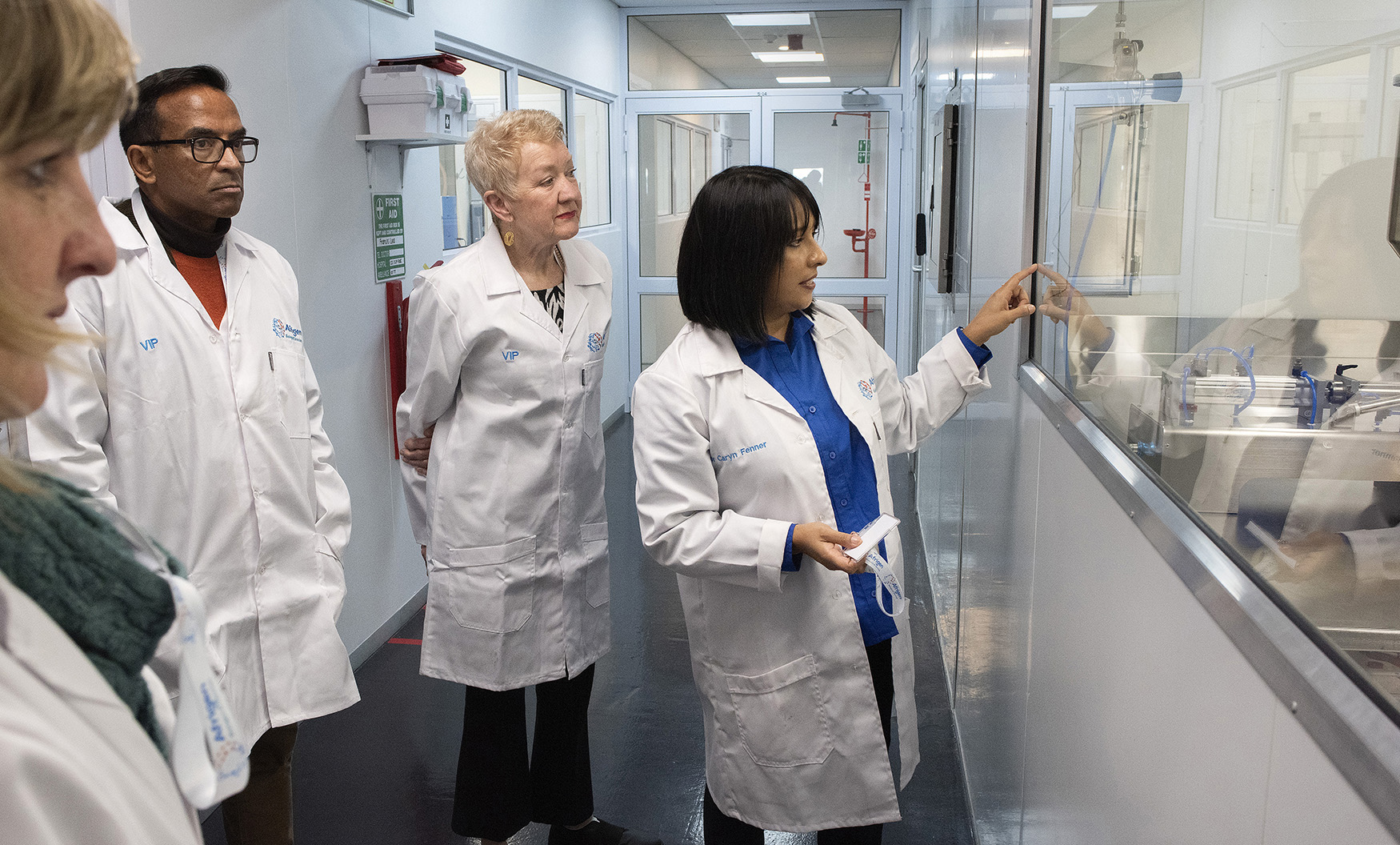
Dr Caryn Fenner (right), Technical Director of Afrigen shows a group of visitors around some of Afrigen’s labs, as part of the mRNA Scientific Colloquium at Afrigen laboratories, the World Health Organization Vaccine Hub, in Cape Town. (Photo: Rodger Bosch / MPP / Spotlight)
Patents remain an obstacle
The new partnership with the NIH boosts the likelihood that Afrigen’s efforts to develop an mRNA Covid-19 vaccine will be successful. “Niaid’s expertise and global reputation can help hub partners solve scientific challenges and draw further support from leading governments,” says Public Citizen’s Peter Maybarduk.
However, the partnership still does not ensure that Afrigen’s commercial partners will have the legal freedom to make and sell mRNA vaccines. This is because Moderna, whose vaccine Afrigen has modelled their own product on, has sought broad monopoly patent protections globally and declined to license these patents and share its expertise with the hub to enable scaled-up manufacturing in developing countries. Moderna has also been slow to register its vaccine in poor countries. The Peoples Vaccine Alliance reported in October 2021, that less than 0.2% of Covid-19 vaccines manufactured and distributed by Moderna went to low-income countries.
There is an argument that the somewhat absurd situation is indicative of a fundamental flaw in the US’s pharmaceutical policy-hub established by the World Health Organization to address severe inequity in access to vaccines by establishing vaccine manufacturing capacity in developing countries, and now supported by the US government, may ultimately be thwarted by the commercial interests of a single for-profit company, that itself largely owes its success to US government support.
Afrigen representatives have repeatedly noted that they are trying to design around Moderna’s patent claims to reduce the chances that Afrigen or its commercial partners will face patent infringement challenges, but that these efforts are slowing the vaccine production process. It is also worried that Moderna’s patent claims are so broad that no matter what Afrigen does to innovate around these claims, the hub and its partners may face infringement claims.
While the South African government can override Moderna’s patents using compulsory licensing provisions in the country’s Patents Act, this strategy is unlikely to be supported by hub partner the Medicines Patent Pool, or Afrigen’s new US government partner. The US government has a history of using trade pressure and other sanctions to punish countries that threaten to override or weaken patent protections in the interest of public health.
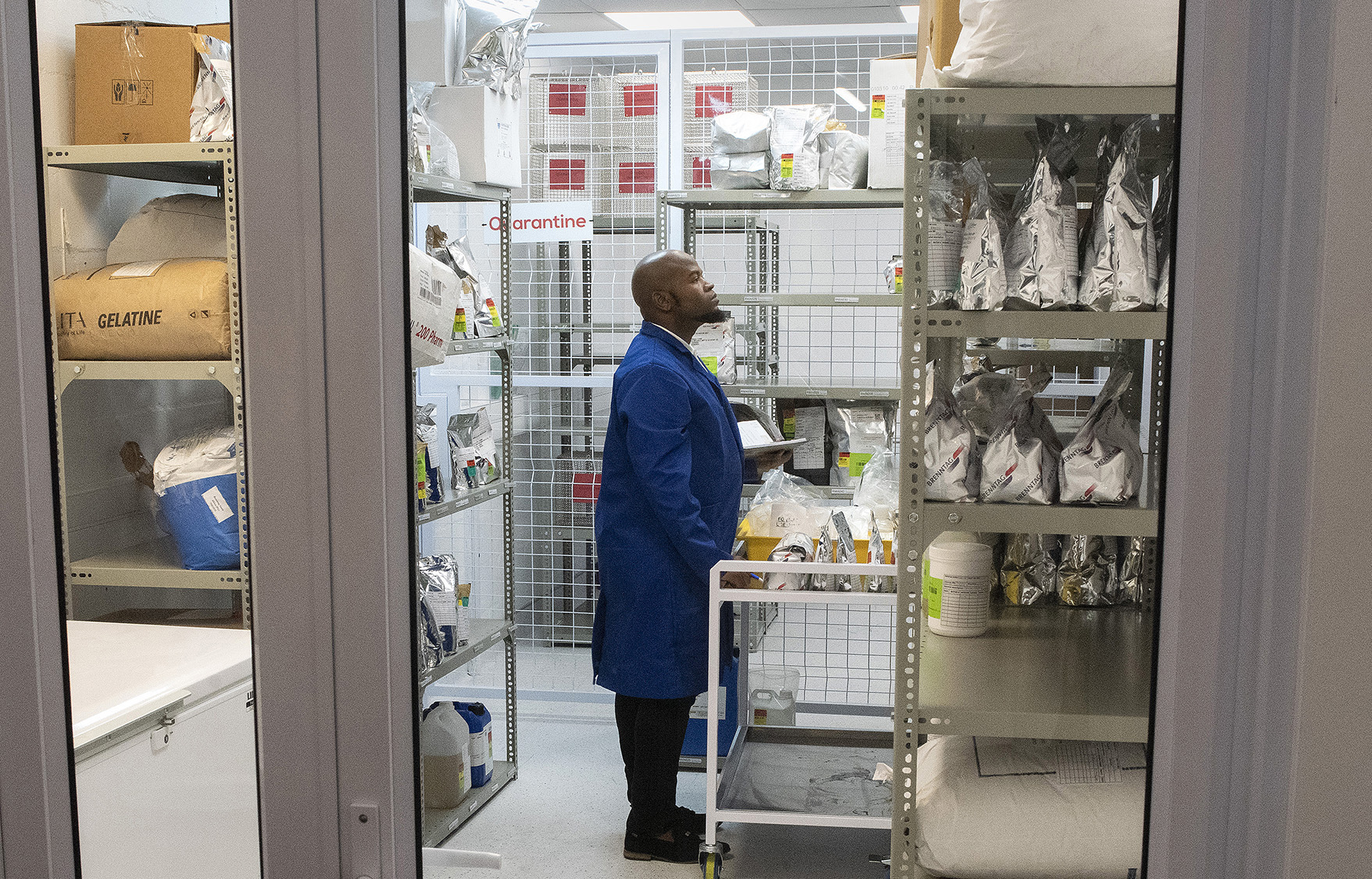
A worker in a supply store at Afrigen laboratories, the World Health Organization Vaccine Hub, in Cape Town. (Photo: Rodger Bosch / MPP / Spotlight)
The US government’s own patent dispute with Moderna
While the US government is not expected to back compulsory licensing as a strategy to support the work of the hub, its support of Afrigen’s efforts to make a Covid-19 mRNA vaccine based on Moderna’s product may be interpreted by some as the NIH thumbing its nose at Moderna.
The US NIH has been involved in its own dispute with Moderna over a key patent on its Covid-19 mRNA vaccine and, specifically, Moderna’s omission of NIH scientists as listed inventors on the patent application. If Moderna includes NIH scientists as inventors on this patent, then the NIH would be able to license the hub and its commercial partners, and others to manufacture a mRNA vaccine using the same active ingredient as used in Moderna’s blockbuster product.
The dispute between Moderna and the NIH is currently on ice as the company has paused its pursuit of the disputed patent — thus extending legal uncertainty for Afrigen and the hub which stands to benefit from NIH licensing.
Further challenges
Beyond the patent issues, there are other challenges that Afrigen must overcome in developing a Covid-19 mRNA vaccine. The company must still gain authorisation from the South African Health Products Regulatory Authority to produce a vaccine substance to be given to people in trial settings, scale-up manufacturing to produce vaccines at the volumes required to conduct clinical trials, and trial its vaccines in humans.
“We will no doubt have further challenges, scale-up and meeting regulatory requirements, etcetera,” says Arbuthnot, “but I think that we’ve overcome a very, very significant hurdle [of technology development] and we are in a position now to capitalise on that and take this technology further.” DM/MC
*This article was published by Spotlight – health journalism in the public interest.



















 Become an Insider
Become an Insider
Comments - Please login in order to comment.